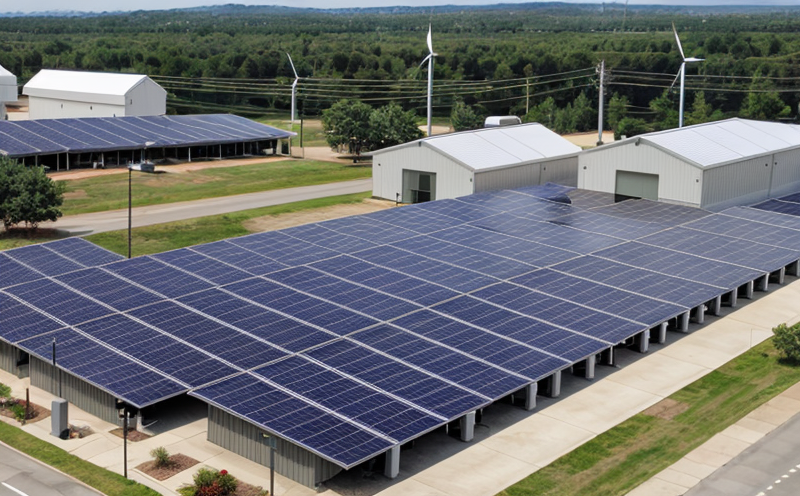UL 2200 Generator Safety Testing in Microgrid Applications
The UL 2200 standard is designed to ensure the safety and reliability of generators used in microgrid systems, which are self-sufficient networks that can operate independently from or in conjunction with the main grid. These systems play a crucial role in enhancing energy security, sustainability, and resilience, especially in remote areas where traditional power supplies may be unreliable or unavailable.
The UL 2200 standard addresses various aspects of generator safety, including electrical, mechanical, and environmental factors that could potentially lead to hazards. Compliance with this standard is essential for manufacturers, installers, and operators of microgrid systems to ensure the safe integration and operation of generators within these complex networks.
The testing process involves a series of rigorous evaluations designed to simulate real-world operating conditions. This includes testing under various load scenarios, temperature ranges, and environmental stresses. The goal is to identify any potential weaknesses or vulnerabilities that could compromise safety or performance.
One of the key aspects of UL 2200 compliance involves ensuring that generators can safely operate in parallel with other power sources within a microgrid system. This requires testing to confirm that all components interact properly and that there are no risks of overloading, short circuits, or electrical arcs.
The standard also emphasizes the importance of generator controls and protection systems. These must be able to detect and respond appropriately to various faults and conditions, ensuring that any issues can be addressed before they escalate into more serious problems. This includes testing for automatic shutdown mechanisms in case of abnormal conditions such as overheating or overvoltage.
Another critical area of focus is the generator's ability to maintain stable operation during power disturbances. This involves testing under sudden load changes, voltage fluctuations, and frequency variations. The aim here is to ensure that generators can quickly adjust their output to compensate for these changes without causing instability in the microgrid.
UL 2200 also covers safety aspects related to fuel systems and emissions control. This includes testing for proper fuel storage, supply, and handling practices as well as ensuring that emissions meet relevant environmental regulations. Proper management of these elements is vital not only for generator safety but also for minimizing the environmental impact of microgrid operations.
The UL 2200 certification process typically involves multiple stages to ensure comprehensive evaluation. Initial testing may include laboratory evaluations under controlled conditions, followed by field tests where generators are deployed in real-world environments. These field trials help identify any issues that might not have been apparent during the initial lab work.
During these field tests, various performance metrics are closely monitored and recorded. Key parameters such as efficiency, power factor, harmonic distortion, and noise levels are measured to ensure they meet specified limits set by UL 2200 standards. Additionally, safety indicators like trip times for overcurrent protection devices are evaluated to confirm compliance with the required time delays.
After successful completion of all tests, a detailed report summarizing the findings is prepared. This document serves as proof that the generator meets the stringent requirements outlined in UL 2200 and can be safely deployed in microgrid applications. It also provides valuable insights into any areas where improvements could enhance performance or safety further.
For quality managers, compliance officers, R&D engineers, and procurement professionals involved in developing or sourcing generators for microgrids, understanding the UL 2200 standard is essential. Familiarity with its provisions allows stakeholders to make informed decisions about product selection, design modifications, and supplier evaluation.
By adhering to the strict protocols outlined in UL 2200, manufacturers can ensure their products are not only safe but also reliable enough to contribute effectively to the overall stability of microgrid systems. This is particularly important given increasing global efforts towards renewable energy adoption and resilience building strategies.
Quality and Reliability Assurance
- Data Logging: Continuous monitoring and logging of critical parameters during testing ensures accurate data collection for analysis.
- Repeatability Testing: Multiple runs under identical conditions to verify consistent results across different trials.
- Environmental Factors: Exposure tests conducted in controlled environments simulating various climatic and operational scenarios.
- Fail-Safe Mechanisms: Evaluation of built-in safety features that activate when certain thresholds are exceeded.
Customer Impact and Satisfaction
Adhering to the UL 2200 standard directly impacts customer satisfaction by delivering products that meet stringent industry benchmarks. This certification enhances trust among clients who rely on reliable, safe generators for their operations.
Customers benefit from reduced maintenance costs due to enhanced durability and longevity of compliant equipment. Moreover, compliance with regulatory requirements reduces the risk of legal disputes or penalties associated with non-compliance.
The UL 2200 certification also plays a role in enhancing brand reputation by demonstrating a commitment to excellence in product design and safety practices. This can lead to increased market share as customers increasingly prefer suppliers who prioritize quality assurance.
Environmental and Sustainability Contributions
The UL 2200 standard contributes significantly to environmental sustainability by promoting the use of generators that are both safe and efficient. Efficient operation reduces fuel consumption, thereby lowering greenhouse gas emissions and other pollutants associated with energy production.
Compliance with this standard supports the transition towards cleaner forms of power generation, which is crucial for reducing carbon footprints globally. By ensuring that only safe and reliable generators enter microgrid systems, the standard helps maintain high standards of environmental stewardship across industries relying on these networks.





